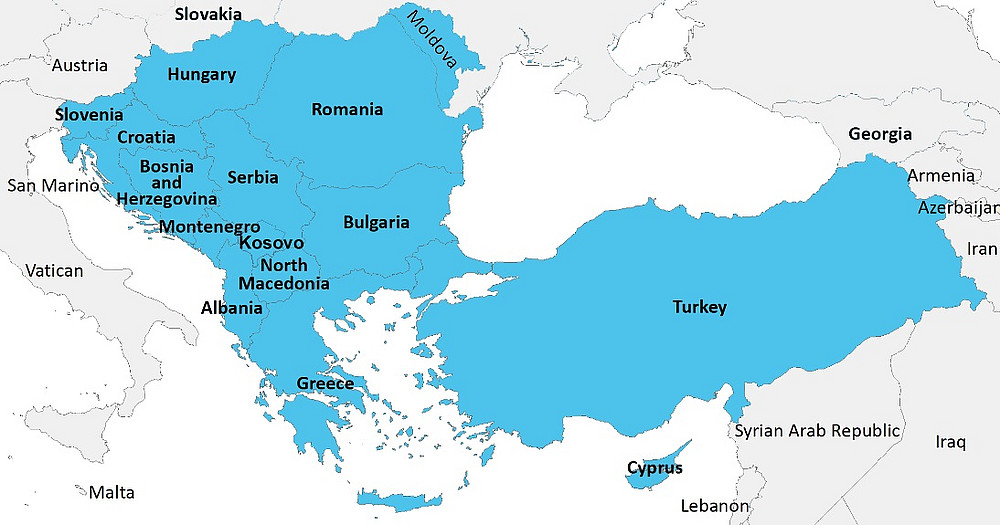University-wide focus region
Thanks to its expertise and knowledge of the needs and cooperation potential of South-Eastern Europe, the University of Graz has long acted as a pioneer for the implementation of the vision of pan-European integration within the EU. To achieve this goal, numerous measures are carried out with, for and about South-Eastern Europe, such as cooperations, scholarships and research projects to be able to fulfil the traditional task of the University of Graz as a bridge to the South-Eastern European region.
Which countries are part of the focus region?
Only the countries in blue on this map are part of the focus region South-Eastern Europe of the University of Graz.

Partner institutions & networks
Here you can find an overview of our partner institutions by country. The University of Graz is also a member of networks with activities and partner institutions in South-Eastern Europe.
Note: list of partner institutions is updated regularly.
| Albania | University of Tirana |
| Bosnia & Herzegovina | |
| Bulgaria | |
| Croatia | Catholic University of Croatia |
| Cyprus | University of Cyprus |
| Greece | Aristotle University of Thessaloniki National and Kapodistrian University of Athens |
| Hungary | |
| Kosovo | |
| North Macedonia | Goce Delčev University of Štip South East European University (SEEU) |
| Romania | Alexandru Ioan Cuza University Iasi Babes-Bolyai University of Cluj-Napoca |
| Serbia | |
| Slovenia | |
| Turkey |
Center for South-Eastern European Studies
The Center was founded in 2008 and since then has been a place of encounter and a bridge between Central and South-Eastern Europe, it serves to bundle university activities in this area and interdisciplinary cooperation. Among other things, the center organises lecture series and public discussion forums. The University of Graz has also been able to position itself as a successful and competent partner in the initiation and handling of projects with a South-Eastern European focus.

Stays in South-Eastern Europe
Mobilities & scholarships
Stays in South-Eastern Europe
Students of the University of Graz can apply for financial and organisational support for stays abroad in the region with the mobility programmes for self-organised mobility, CEEPUS, Erasmus+ mobility or Erasmus+ International - to name only a few.
Research, teaching or training stays of Uni Graz staff at South-Eastern European partner institutions are supported by the following mobility programmes/measures:
- Erasmus+ teaching stays: Outgoing (Intranet*)
- Erasmus+ International Teaching Stays: Outgoing (Intranet*)
- Erasmus+ Training Stays: Outgoing (Intranet*)
- Erasmus+ International Training Stays: Outgoing (Intranet*)
- CEEPUS (Intranet*)
- Mobility grant for the promotion of international relations (Intranet*)
The application must be submitted by Uni Graz staff!
Stays at the University of Graz
South-Eastern European students can apply for mobility programmes at their home institution in order to spend a semester or academic year at the University of Graz. The scholarship programmes "Best of South-East" and "Go Styria" are further offers for students or graduates from the region.
South-Eastern European staff, researchers or teachers can apply for a stay at the University of Graz within various mobility programmes such as Erasmus+ or Erasmus+ International at their home university. In addition, there are the following scholarships for stays at the University of Graz:
- CEEPUS
- Coimbra Group Scholarship Programme
- Go Styria Scholarship for PostDocs
- Mobility grant for the promotion of international relations (Intranet*)
The application must be submitted by Uni Graz staff!
* The Intranet is only accessible for Uni Graz staff.
The university-wide focus on South-Eastern Europe is also shown in the range of study programmes offered at the University of Graz, here are a few examples:
- Joint Master's Programme in South-Eastern European Studies
- Joint Programme Translation (Slowenisch - Deutsch - Englisch)
- Bosnian / Croate / Serbian: Bachelor's degree, Master's degree
- Slovenian: Bachelor's degree, Master's degree
- Transcultural Communication, see website of the Department of Translation Studies
There is also an extensive language course offer for South-Eastern European languages at treffpunkt sprachen - Centre for Language, Plurilingualism and Didactics for students, staff and external persons.